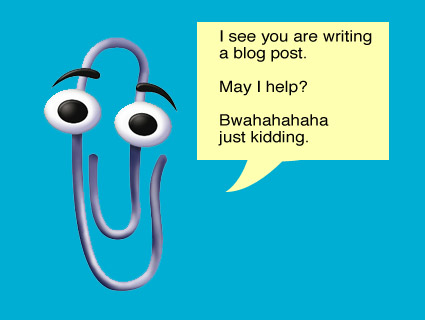
Photo illustration: <a href="/authors/dave-gilson">Dave Gilson</a>
Zack Beauchamp links today to yet another person whining about Microsoft Word, and when I clicked the link I was primed to get annoyed all over again at this never-ending meme. Yeah, yeah, Clippy. Who cares? Just disable him. Ditto for grammar check and autocorrect and a few other things. It’s not that big a deal. Word has plenty of things to dislike, especially once you get down in the weeds, but if you just want to write something it basically works fine. Get a life, folks.
But it turns out that Tom Scocca is actually complaining about something else entirely:
What makes Word unbearable is the output. Like the fax machine, Word was designed to put things on paper…That’s great if you’re making a lot of church bulletins or lost-dog fliers. Keep on using Word.
…For most people now, though, publishing means putting things on the Web. Desktop publishing has given way to laptop or smartphone publishing. And Microsoft Word is an atrocious tool for Web writing. Its document-formatting mission means that every piece of text it creates is thickly wrapped in metadata, layer on layer of invisible, unnecessary instructions about how the words should look on paper. I just went into Word and created a file that read, to the naked eye, as follows:
[Immense amount of formatting crap follows.]
The whole sprawling thing runs to 16,224 characters. When I dumped it back into Word, it was an eight-page document. Online publishing systems gag on this stuff; gremlins breed in the hidden spaces. Some publishing platforms have a built-in button especially for pasting text from Word, to clear away the worst of it, but they don’t work very well. Beyond the invisible code, there are those annoying typographical flourishes—the ordinal superscripts, the directional quotation marks, the automatic em dashes—that will create their own headaches in translation. Multiple websites exist simply to unmangle Word text and turn it into plain text or readable HTML.
Okay, this is totally true. And inexplicable. When I complain about sometimes losing blog posts, for example, a common bit of advice is to write offline in, say, Word, and then paste the text into the blog editor. If it crashes, I still have the original in Word. Plus I get Word’s built-in spell-check.
Luckily I’m a good speller, so I don’t really need spell-check. I say luckily, because Scocca is right: Composing in Word and then pasting the text into something like a blog editor is all but impossible. I have no idea why. However, this has generated something that I consider a pretty amusing irony. I’ve spent my entire life moving to more and more powerful word processing technology: typewriter to Wang to Scripsit (!) to MASS-11 on a VAX to Ami Pro to Word 3, then Word 4, then Word whatever. So what do I use today? About 98 percent of my writing is done in a primitive text editor that provides me with the ability to indent, make bullet lists, and format my words with simple bold and italic. That’s about it. In other words, approximately the same level of technology as a crude text editor from 1978.
And it works fine. I still use Word when I’m drafting long-form articles, but not for much else. For the online world, it’s a dinosaur.













